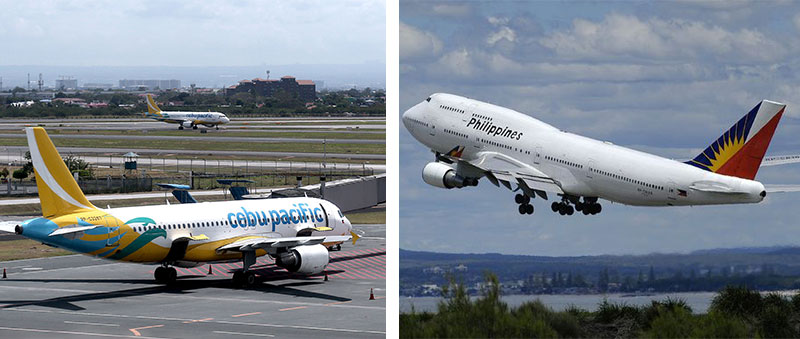
Cebu Pacific and Philippine Airlines have slashed nearly 500 jobs over the last two months and more could follow.
The Philippines’ top three airlines are seeking a financial lifeline from the Duterte administration as the new coronavirus disease (COVID-19) deals an “existential threat” to the domestic aviation sector—mirroring the crisis facing the industry globally.
The Air Carriers Association of the Philippines (Acap), comprised of Philippine Airlines, Cebu Pacific and AirAsia Philippines, called on the government to urgently intervene as revenues run dry while billions of pesos in refunds and fixed costs mount.
Specifically, Acap is seeking government guarantees on debt, six-month emergency credit lines apart from long-term loans with low interest rates and a waiver on navigational and airport charges, which are currently being deferred.
Acap is also asking for a coordinated response on the issue relating to the resumption of flights between the national government and local government units given that their policies sometimes diverge.
The requests were contained in a March 25 letter to the departments of Transportation, Finance, Tourism and of Trade and Industry and the National Economic and Development Authority.
Acap emphasized the assistance was not a “handout at the expense of the Filipino taxpayers” but access to working capital as airlines have ongoing expenses while main revenue streams have evaporated.
“Everybody is scrambling for cash. Liquidity is a problem now,” Acap vice chair Roberto Lim said in an interview on Tuesday.
This is the second letter that Acap had sent to the administration. Lim said the government has yet to formally respond to their requests.
“We will ask the BSP (Bankgo Sentral ng Pilipinas) to support the banks that support their clients, including the airlines,” Finance Secretary Carlos Dominguez III told reporters in a text message on Tuesday.
Lim said the three airlines have paid out some P7 billion in refunds as flights were canceled due to travel bans in the Philippines and overseas. He estimated their combined fixed costs at P8 billion a month.
Moreover, the Luzon enhanced community quarantine has forced the carriers to suspend all flights for about a month until the middle of April 2020. This has prompted the cancellation of 30,000 flights, affecting five million passengers, Acap said.
Lim said the airlines were working to lower costs and he did not rule out job losses if financial assistance would not be provided.
PAL and Cebu Pacific had slashed nearly 500 jobs over the last two months and more could follow. The three carriers employ about 12,000 workers combined while indirectly supporting thousands of other jobs supporting the aviation sector.
Acap said wealthier countries such as New Zealand, Australia and Canada have set aside relief packages to support their airlines. It said Canada has promised an $82-billion assistance to its carriers.
“Acap member airlines assure the government that these financing will be used for legitimate business stabilization purposes with the corresponding governance in place,” Acap said in its letter. INQ